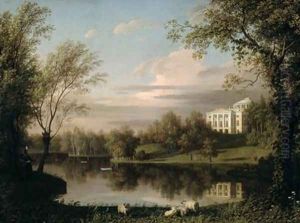Carl Ferdinand von Kugelgen Paintings
Carl Ferdinand von Kügelgen was a German painter born on February 2, 1772, in Bacharach on the Rhine. He is best known for his work as a portraitist and his contributions to the art scene during the Romantic period. His paintings often exhibit a deep emotional resonance, characteristic of Romanticism, and he is recognized for his skill in capturing the character and essence of his subjects.
Kügelgen received his initial art education from his father, the painter Franz Gerhard von Kügelgen. He then continued his studies in Koblenz with the artist Johann Friedrich August Tischbein. In the 1790s, he traveled extensively throughout Europe, which included a significant stay in Italy from 1799 to 1805, where he was deeply influenced by the Italian masters. His time in Italy was pivotal, as he absorbed the techniques and styles that would later define his artistic output.
Upon his return to Germany, Kügelgen settled in Dresden in 1808 and became a member of the Dresden Academy of Fine Arts. He quickly established himself as a sought-after portrait artist within the higher circles of German society. His portraits were noted for their psychological depth and often featured notable figures of his time, including poets, philosophers, and members of the nobility.
Kügelgen's work was also marked by his involvement in building a cultural identity for the burgeoning national sentiment in Germany. He was a contemporary of Caspar David Friedrich, another key figure of German Romanticism, though Kügelgen's work was less focused on landscapes and more on the human figure and face.
Tragically, Carl Ferdinand von Kügelgen's life was cut short when he was murdered during a robbery on March 27, 1832, in Loschwitz, near Dresden. His legacy continued through his children, as his twin sons, Karl and Gerhard von Kügelgen, also became painters and upheld the family's artistic traditions. Today, Carl Ferdinand von Kügelgen's work is preserved in several museums, and his portraits remain valuable for their historical significance and their embodiment of Romantic ideals.
